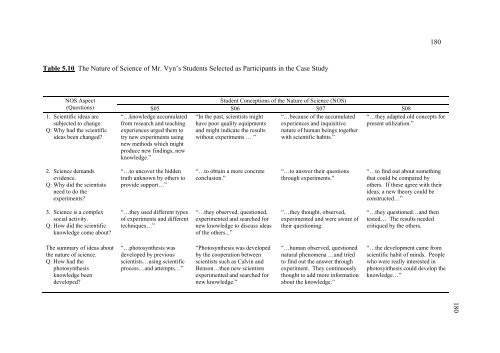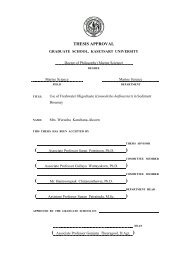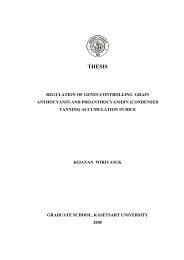an innovative approach
an innovative approach
an innovative approach
You also want an ePaper? Increase the reach of your titles
YUMPU automatically turns print PDFs into web optimized ePapers that Google loves.
Table 5.10 The Nature of Science of Mr. Vyn’s Students Selected as Particip<strong>an</strong>ts in the Case Study<br />
NOS Aspect<br />
Student Conceptions of the Nature of Science (NOS)<br />
(Questions) S05 S06 S07 S08<br />
1. Scientific ideas are “…knowledge accumulated “In the past, scientists might “…because of the accumulated “…they adapted old concepts for<br />
subjected to ch<strong>an</strong>ge. from research <strong>an</strong>d teaching have poor quality equipments experiences <strong>an</strong>d inquisitive present utilization.”<br />
Q: Why had the scientific experiences urged them to <strong>an</strong>d might indicate the results nature of hum<strong>an</strong> beings together<br />
ideas been ch<strong>an</strong>ged? try new experiments using<br />
new methods which might<br />
produce new findings, new<br />
knowledge.”<br />
without experiments … ” with scientific habits.”<br />
2. Science dem<strong>an</strong>ds<br />
evidence.<br />
Q: Why did the scientists<br />
need to do the<br />
experiments?<br />
3. Science is a complex<br />
social activity.<br />
Q: How did the scientific<br />
knowledge come about?<br />
The summary of ideas about<br />
the nature of science.<br />
Q: How had the<br />
photosynthesis<br />
knowledge been<br />
developed?<br />
“…to uncover the hidden<br />
truth unknown by others to<br />
provide support…”<br />
“…they used different types<br />
of experiments <strong>an</strong>d different<br />
techniques…”<br />
“…photosynthesis was<br />
developed by previous<br />
scientists…using scientific<br />
process…<strong>an</strong>d attempts…”<br />
“…to obtain a more concrete<br />
conclusion.”<br />
“…they observed, questioned,<br />
experimented <strong>an</strong>d searched for<br />
new knowledge to discuss ideas<br />
of the others...”<br />
“Photosynthesis was developed<br />
by the cooperation between<br />
scientists such as Calvin <strong>an</strong>d<br />
Benson…then new scientists<br />
experimented <strong>an</strong>d searched for<br />
new knowledge.”<br />
“…to <strong>an</strong>swer their questions<br />
through experiments.”<br />
“…they thought, observed,<br />
experimented <strong>an</strong>d were aware of<br />
their questioning.<br />
“…hum<strong>an</strong> observed, questioned<br />
natural phenomena …<strong>an</strong>d tried<br />
to find out the <strong>an</strong>swer through<br />
experiment. They continuously<br />
thought to add more information<br />
about the knowledge.”<br />
180<br />
“…to find out about something<br />
that could be compared by<br />
others. If these agree with their<br />
ideas, a new theory could be<br />
constructed…”<br />
“…they questioned…<strong>an</strong>d then<br />
tested… The results needed<br />
critiqued by the others.<br />
“…the development came from<br />
scientific habit of minds. People<br />
who were really interested in<br />
photosynthesis could develop the<br />
knowledge…”<br />
180
















